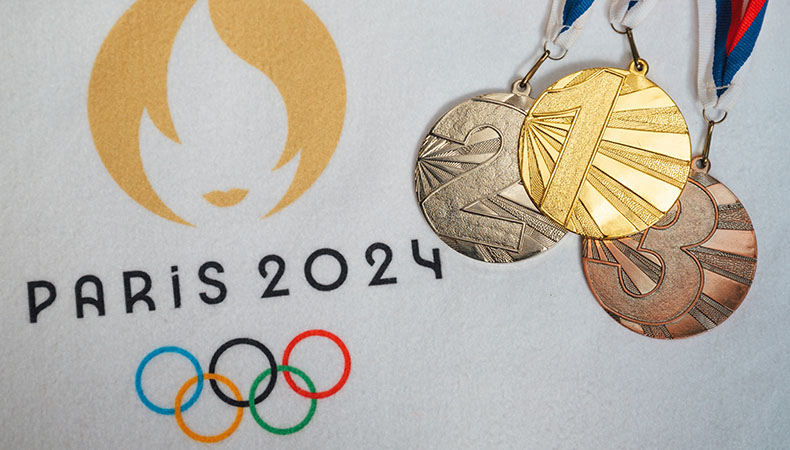What the Olympics taught us about getting symbolic awards right
When Paris Olympians started complaining about the quality of their medals, it shone a light on the importance of getting symbolic awards just right.
If the Olympics can get it wrong, then it proves just how easy it is for symbolic awards to miss the mark.
Rewards and benefits professionals can learn a lot from this high-profile example.
What went wrong in Paris?
As it stands, an Olympic medal is one of the most coveted and meaningful symbols of achievement in mankind’s history, representing over 2,000 years of competitors pushing themselves to the extreme.
It's about victory, triumph and courage and is worn with great pride.
This is why it not only needs to be meaningful and impactful, but also high quality and durable.
Unfortunately, the Olympics came under criticism when its medals, particularly its bronze medals, showed signs of deterioration just days after the recipients received them.
Negative publicity that followed suggested that by providing an award that was clearly substandard, the organisers were not delivering on the incredible Olympics experience they’d promised.
What does this teach us?
What lessons can we learn from this to ensure symbolic awards are always impactful and highly valued, whether it’s an award for a career celebration or going above and beyond?
Start with the meaning
The whole point of a symbolic award is that it’s special and stirs emotion, helping to strengthen the connections between the recipient and their managers, peers and the organisation itself.
I always start with a discovery call to clients to learn as much as possible about their culture, purpose and what makes them special.
I want to know how their employees feel about working there; urban legends or myths; their history; what's important to them now; and their hopes for the future.
This is alongside all the ways they are looking to reward their people, and the time and effort that go into their employees’ achieving their accomplishments.
The Paris Olympics did well here as they incorporated a small piece of the Eiffel Tower into each medal to represent the magnitude of the occasion and their lifelong connection to Paris.
Connecting meaning to the award is the first vital step.
How do you want employees to feel?
It’s crucial to imagine how you’d like employees to feel when receiving their award - that special moment when something is presented to them.
- How do you want it to look in their hand and how will it be presented?
- How do you want them to feel when looking at their award in months if not years’ to come?
- Will it adequately honour their time with the company, their hard work and their sacrifice?
This provides a framework to start creating concepts.
The Paris Olympic medals are beautiful examples of well-designed medals that gave recipients that “wow” factor on first receiving them. For some though, this feeling didn’t last becaiuse of the poor craftsmanship of the medals.
Focus on durability more than cost
You obviously don’t want anything to look “cheap” but at the same time, a symbolic award doesn’t need to cost a fortune.
Customised awards can be tailored for lower budgets so long as thought is put into the design and materials used.
My motto is “no faux” which means working with authentic materials which feel as good in your hand as they look from 10 feet away.
If it looks like metal, it needs to be metal and it needs to last.
This appears to have been the biggest downfall of the Olympic medals, especially the bronze medal as the craftsmanship doesn’t appear to have been up to standard.
If an award appears low quality and easily wears, what message are you giving to the recipient?
They will likely feel that you’ve cut corners because you simply don’t value them enough.
Use symbolic awards to honour all levels of accomplishment
It’s important to honour all levels of accomplishment, big and small.
Don’t just reserve symbolic awards for your biggest ‘winners’, it’s all about the right award for the right moment.
A good example of this is that every member of the U.S. Olympics team, whether they reached the podium or not, were presented with a symbolic ring by O.C. Tanner.
Similarly, organisations need to consider how they should harness symbolic awards to recognise their people’s achievements – whether they reach ‘podium position’ or not.
Creating the perfect symbol
Symbolic awards are important to boost a person’s recognition experience and allowing them to reflect - time and time again - on their achievements.
They need to be tailored to the recognition moment, deliver an emotional response and stand the test of time.
As the Olympics has taught us, you can’t get just some of this right, but all of it must be carefully considered.
This ensures the symbolic award is the perfect tangible and long-term reminder of excellence, hard work and dedication.
Supplied by REBA Associate Member, O. C. Tanner
The worldwide leader in employee recognition solutions that help people thrive at work.








